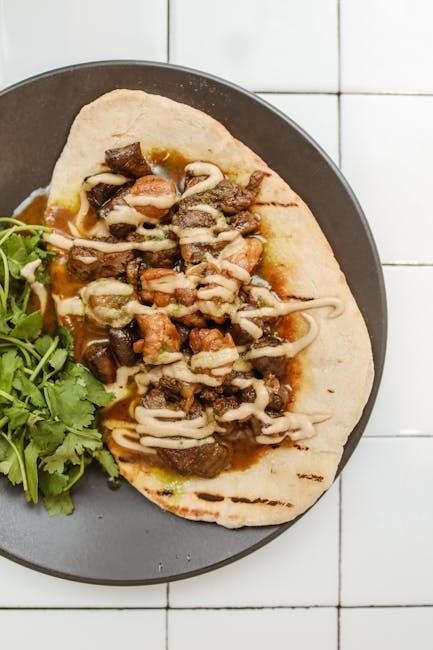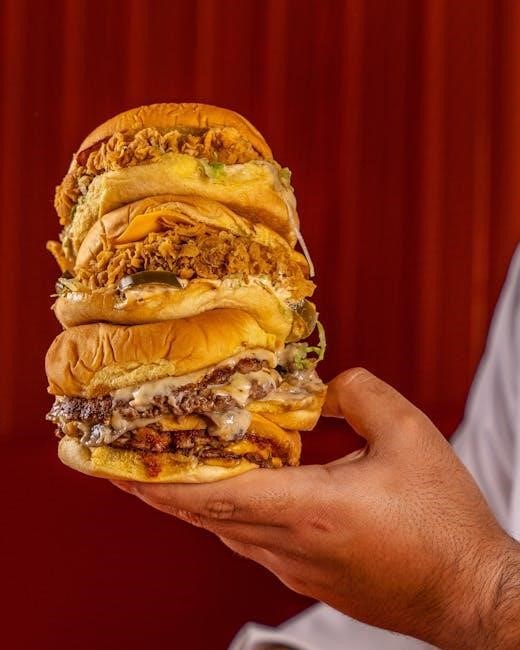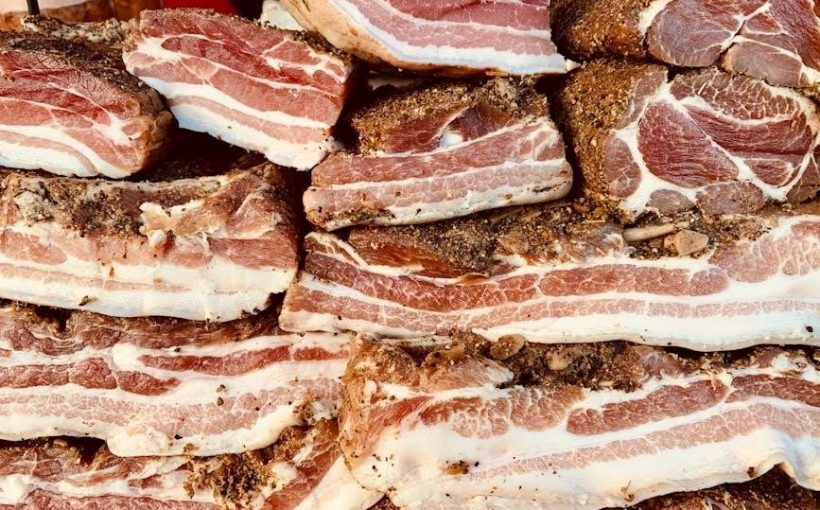A fatty liver meal plan PDF offers a structured approach to managing fatty liver disease through diet, focusing on nutrient-dense foods to reduce liver inflammation and promote healing.

Understanding Fatty Liver Disease
Fatty liver disease occurs when excess fat accumulates in the liver, often due to poor diet, obesity, or insulin resistance, making dietary changes essential for management.
Causes and Risk Factors
Fatty liver disease often stems from obesity, insulin resistance, and excessive alcohol use. Other risk factors include high triglycerides, metabolic syndrome, and genetic predisposition. Poor dietary habits, such as consuming high amounts of sugar and saturated fats, can also contribute to liver fat accumulation. Early diagnosis and lifestyle changes are crucial to prevent progression to more severe liver damage. Understanding these causes helps in tailoring an effective fatty liver meal plan PDF for better management.
The Role of Diet in Managing Fatty Liver
Diet plays a pivotal role in managing fatty liver disease by reducing liver inflammation and fat accumulation. A well-structured fatty liver meal plan PDF emphasizes whole, unprocessed foods, such as vegetables, fruits, lean proteins, and healthy fats. It limits added sugars, saturated fats, and processed foods, which exacerbate liver damage. By fostering a balanced intake of nutrients, a tailored diet helps improve liver function and overall health, making it a cornerstone of fatty liver management.

Best Foods to Eat for Fatty Liver
Focus on high-fiber foods, lean proteins, and healthy fats to support liver health. Include fatty fish for omega-3s, antioxidant-rich foods like berries, and leafy greens for detoxification. Nuts, seeds, and avocados provide essential fats, while whole grains aid digestion. These foods help reduce inflammation, improve fat metabolism, and promote liver function, making them ideal for a fatty liver diet.
High-Fiber Foods
High-fiber foods are essential for managing fatty liver disease. They help regulate digestion, control blood sugar levels, and reduce liver fat accumulation. Include whole grains like oats, barley, and quinoa, as well as vegetables such as broccoli, Brussels sprouts, and leafy greens. Legumes like lentils and chickpeas are also excellent sources of fiber. Fiber-rich foods promote satiety, support weight management, and improve overall liver health. Aim for a variety of colorful, unprocessed foods to maximize fiber intake and enhance liver function.
Lean Protein Sources
Lean proteins are vital for liver health, aiding in repair and reducing fat accumulation. Opt for skinless poultry like chicken and turkey, fish such as salmon and cod, and plant-based options like tofu and legumes. These sources provide essential amino acids without excess saturated fats, supporting liver function and overall well-being. Incorporating lean proteins into meals helps maintain muscle mass and promotes a balanced diet, crucial for managing fatty liver disease effectively.
Healthy Fats
Healthy fats, such as avocados, nuts, seeds, and olive oil, are essential for reducing inflammation and improving lipid profiles. These fats support liver health by aiding in the absorption of vitamins and minimizing oxidative stress. Incorporating them in moderation helps balance the diet and promotes overall well-being, making them a key component of a fatty liver meal plan.
Fatty Fish and Omega-3 Fatty Acids
Fatty fish like salmon, mackerel, and trout are rich in omega-3 fatty acids, which help reduce inflammation and improve liver health. These fats support liver function by lowering triglycerides and promoting a healthier lipid profile. Incorporating fatty fish 2-3 times a week can significantly benefit those managing fatty liver disease, making them a vital part of a balanced meal plan.
Antioxidant-Rich Foods
Antioxidant-rich foods, such as berries, leafy greens, and nuts, play a crucial role in combating oxidative stress and inflammation in the liver. These foods are packed with vitamins C and E, which help neutralize free radicals and protect liver cells from damage. Incorporating antioxidant-rich foods into your diet can enhance liver function and support overall health, making them a key component of a fatty liver meal plan.
Foods to Avoid
Limit or avoid saturated fats, added sugars, processed meats, and alcohol, as they can worsen liver inflammation and fat accumulation, hindering recovery and health progress.
Saturated and Trans Fats
Saturated and trans fats, commonly found in fried foods, processed snacks, and red meats, can worsen liver inflammation and fat accumulation. These fats disrupt liver function and promote insulin resistance, exacerbating fatty liver disease. Limiting or avoiding foods like butter, lard, and partially hydrogenated oils is crucial. Instead, opt for healthier fats like nuts, seeds, and fatty fish, which support liver health and reduce inflammation. This dietary adjustment is vital for managing and reversing fatty liver disease effectively.
Added Sugars
Added sugars, found in sugary drinks, sweets, and desserts, contribute to insulin resistance and liver fat accumulation. High sugar intake promotes inflammation and worsens fatty liver disease. Limiting sugary beverages and processed treats is essential. Opt for natural sources of sweetness, such as fruits, to satisfy cravings while supporting liver health. Reducing sugar intake helps lower liver fat and improves overall metabolic function, making it a key component of a fatty liver meal plan.
Processed Meats
Processed meats, such as hot dogs, sausages, and bacon, are high in saturated fats, sodium, and preservatives, which can contribute to liver stress. These foods are often linked to increased inflammation and oxidative damage, worsening fatty liver disease. Limiting or avoiding processed meats is crucial for improving liver health. Opting for lean, unprocessed protein sources like poultry, fish, or plant-based options can help reduce liver fat accumulation and support overall well-being. A balanced diet minimizes reliance on these harmful foods.
Highly Processed Foods
Highly processed foods, such as snack bars, frozen meals, and sugary snacks, are typically high in unhealthy fats, added sugars, and sodium. These foods can exacerbate fatty liver disease by promoting insulin resistance and inflammation. They often contain artificial additives that strain liver function. Incorporating whole, unprocessed foods like vegetables, fruits, and whole grains is essential for improving liver health and reducing fat accumulation. Avoiding these foods helps maintain a balanced and liver-friendly diet.
Excessive Sodium
Excessive sodium can worsen fatty liver disease by increasing blood pressure and liver inflammation. Processed foods, condiments, and canned goods are major sources of high sodium. Reducing sodium intake helps lower blood pressure and reduces liver strain. Opting for fresh, unprocessed foods and using herbs and spices for flavor can help manage sodium levels effectively. Limiting sodium is a crucial step in supporting liver health and overall well-being.
Alcohol
Alcohol is a significant contributor to liver damage, particularly for those with fatty liver disease. Complete avoidance is often recommended, especially in advanced cases, as it can worsen inflammation and scarring. Even moderate consumption may increase the risk of liver damage, making abstinence crucial for recovery and maintaining liver health.

7-Day Meal Plan for Fatty Liver
A structured 7-day meal plan for fatty liver disease focuses on nutrient-dense foods to reduce inflammation and fat buildup, promoting liver health and overall well-being effectively.
Start with simple, nutrient-rich meals to ease into the fatty liver diet. Breakfast: oatmeal with berries and nuts for fiber and antioxidants. Mid-morning snack: apple slices with almond butter for healthy fats and protein. Lunch: grilled chicken salad with mixed greens, cucumbers, and olive oil dressing. Dinner: baked salmon with steamed broccoli and quinoa. Evening snack: Greek yogurt with fresh berries. These meals prioritize lean proteins, whole grains, and vegetables to support liver health and reduce fat accumulation.
Day 4-7: Incorporating Variety and Flavor
Expand your menu with diverse flavors while maintaining liver-friendly choices. Day 4: avocado omelet for breakfast, herb-roasted chicken with asparagus for lunch, and baked cod with quinoa and spinach for dinner. Day 5: Greek yogurt parfait, grilled turkey wrap, and shrimp stir-fry with brown rice. Day 6: smoothie bowl, lentil soup, and roasted vegetable salad. Day 7: scrambled eggs with veggies, tuna salad, and baked sweet potato with black beans. Stay hydrated with water and green tea.

Grocery List and Budget Tips
Affordable and nutritious choices are key. Oats, nuts, and whole grains are cost-effective and support liver health. Buy in bulk to reduce costs. Plan meals around these staples for a sustainable approach. Download a detailed grocery list to simplify shopping and stay on budget.
Purchasing Affordable and Nutritious Ingredients
Choosing affordable and nutritious ingredients is essential for a fatty liver meal plan. Oats, nuts, and whole grains are budget-friendly and packed with nutrients. Buying in bulk reduces costs and ensures a steady supply of staples like quinoa and brown rice. Opt for seasonal fruits and vegetables, which are often cheaper and fresher. Incorporating plant-based proteins like beans and lentils can also be cost-effective and liver-friendly. Plan meals around these ingredients to maximize nutrition and minimize expense, ensuring a sustainable approach to liver health.
Downloadable Grocery List
A downloadable grocery list for a fatty liver meal plan PDF simplifies shopping by organizing essential ingredients. It includes liver-friendly foods like whole grains, lean proteins, and healthy fats. The list can be customized to suit preferences and shared with others for convenience. By prioritizing nutrient-dense items, it helps maintain a balanced diet and supports liver health. This tool ensures adherence to the meal plan while making grocery shopping efficient and stress-free.

Monitoring Progress and Adjustments
Regular liver check-ups and tracking weight loss help monitor progress. Adjustments to diet or exercise may be needed based on improvements in liver health and overall well-being.
Regular Liver Check-Ups
Regular liver check-ups are crucial for monitoring fatty liver progression. Blood tests, imaging, and biopsies help assess liver health. These check-ups ensure the meal plan’s effectiveness and guide adjustments. Consistent monitoring enables early detection of improvements or potential issues, allowing timely modifications to diet or treatment. Healthcare providers use these results to tailor recommendations, ensuring the best outcomes for liver health and overall well-being. Regular check-ups are a cornerstone of successful fatty liver management.
Tracking Weight Loss and Health Improvements
Tracking weight loss and health improvements is essential for managing fatty liver disease. A food diary and weekly weigh-ins help monitor progress. Measuring liver enzymes and fat levels ensures the diet’s effectiveness. Regular health assessments reveal reductions in inflammation and fat accumulation, motivating continued adherence to the meal plan. Visible improvements in energy and overall health reinforce the benefits of dietary changes, encouraging long-term commitment to liver-friendly habits and lifestyle adjustments.
Additional Lifestyle Changes
Regular physical activity and hydration are vital for fatty liver management. Combining diet with exercise improves liver function and overall health, while avoiding alcohol and smoking supports recovery.
Physical Activity and Exercise
Regular physical activity is crucial for managing fatty liver disease. Exercise helps burn fat, improve insulin sensitivity, and reduce liver inflammation. Aim for at least 150 minutes of moderate-intensity exercise, such as walking, cycling, or swimming, per week. Strength training can also help build muscle and boost metabolism; Combining physical activity with a healthy diet enhances liver health and promotes sustainable weight loss. Consistency is key to achieving long-term benefits for liver function and overall well-being.
Hydration and Beverage Choices
Staying hydrated is essential for liver health, as water helps flush toxins from the body. Opt for water, herbal teas, and green tea, which offer antioxidants. Consider milk thistle tea for liver support and beet juice for detoxification benefits. Limit sugary drinks and alcohol, as they can worsen liver conditions. Prioritize beverages that support liver function and avoid those that may cause inflammation or damage. Hydration is a simple yet effective way to promote overall liver well-being.
Consulting a Healthcare Professional
Consulting a healthcare professional is crucial for personalized advice on managing fatty liver disease. They can help create a tailored meal plan and monitor progress effectively.
Importance of Personalized Advice
Personalized advice from a healthcare professional ensures a tailored approach to managing fatty liver disease. They consider individual health status, dietary needs, and lifestyle to create an effective plan. This customization helps optimize nutrition, reduce liver fat, and improve overall health. A healthcare provider can also monitor progress and adjust the meal plan as needed. Their expertise ensures the diet is both sustainable and aligned with personal goals, leading to better long-term outcomes for liver health.
Creating a Sustainable Meal Plan
A sustainable meal plan for fatty liver disease focuses on long-term health benefits rather than quick fixes. It incorporates liver-friendly foods like whole grains, lean proteins, and healthy fats while avoiding harmful ingredients. Budget-friendly options and variety ensure the plan is maintainable. Regular updates and flexibility accommodate changing needs, promoting adherence and overall well-being. This approach empowers individuals to make lasting dietary changes that support liver health and reduce disease progression effectively.
Adopting a liver-friendly diet through a structured meal plan can significantly improve fatty liver management, promoting long-term liver health and overall well-being with sustainable benefits.
Long-Term Benefits of a Fatty Liver Diet
A fatty liver diet offers lasting benefits, including reduced liver fat accumulation, lowered inflammation, and improved insulin sensitivity. It supports sustainable weight management and enhances metabolic health; By focusing on nutrient-dense foods, the diet helps prevent disease progression and reduces the risk of chronic conditions like type 2 diabetes and cardiovascular issues. Long-term adherence promotes better digestion, increased energy levels, and overall well-being, making it a cornerstone of fatty liver management and liver health improvement.
